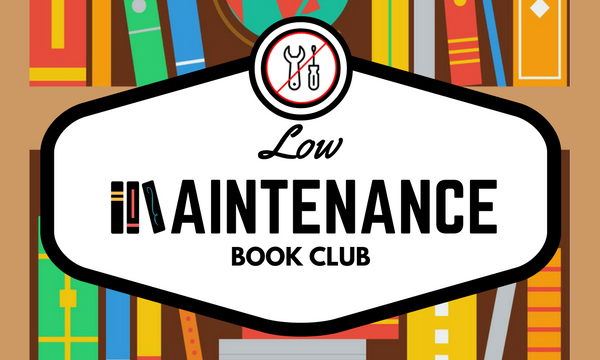
Looking for something new to read? Check out our New and Noteworthy, Overdrive, and Current Literature collections for some good reads to enjoy!
 Chatter: The Voice in our Head, Why It Matters, and How to Harness It by Ethan Kross. Tell a stranger that you talk to yourself, and you’re likely to get written off as eccentric. But the truth is that we all have a voice in our head. When we talk to ourselves, we often hope to tap into our inner coach but find our inner critic instead. When we’re facing a tough task, our inner coach can buoy us up: Focus–you can do this. But, just as often, our inner critic sinks us entirely: I’m going to fail. They’ll all laugh at me. What’s the use? Ethan Kross explores the silent conversations we have with ourselves. Interweaving groundbreaking behavioral and brain research from his own lab with real-world case studies–from a pitcher who forgets how to pitch, to a Harvard undergrad negotiating her double life as a spy–Kross explains how these conversations shape our lives, work, and relationships. You can read reviews here, here, and here.
Chatter: The Voice in our Head, Why It Matters, and How to Harness It by Ethan Kross. Tell a stranger that you talk to yourself, and you’re likely to get written off as eccentric. But the truth is that we all have a voice in our head. When we talk to ourselves, we often hope to tap into our inner coach but find our inner critic instead. When we’re facing a tough task, our inner coach can buoy us up: Focus–you can do this. But, just as often, our inner critic sinks us entirely: I’m going to fail. They’ll all laugh at me. What’s the use? Ethan Kross explores the silent conversations we have with ourselves. Interweaving groundbreaking behavioral and brain research from his own lab with real-world case studies–from a pitcher who forgets how to pitch, to a Harvard undergrad negotiating her double life as a spy–Kross explains how these conversations shape our lives, work, and relationships. You can read reviews here, here, and here.
 The Final Girl Support Group by Grady Hendrix, author of The Southern Book Club’s Guide to Slaying Vampires. Lynette Tarkington is a real-life final girl who survived a massacre. For more than a decade, she’s been meeting with five other final girls and their therapist in a support group for those who survived the unthinkable, working to put their lives back together. Then one woman misses a meeting, and their worst fears are realized—someone knows about the group and is determined to rip their lives apart again, piece by piece. But the thing about final girls is that no matter how bad the odds, how dark the night, how sharp the knife, they will never, ever give up. Read a review here, and an interview here.
The Final Girl Support Group by Grady Hendrix, author of The Southern Book Club’s Guide to Slaying Vampires. Lynette Tarkington is a real-life final girl who survived a massacre. For more than a decade, she’s been meeting with five other final girls and their therapist in a support group for those who survived the unthinkable, working to put their lives back together. Then one woman misses a meeting, and their worst fears are realized—someone knows about the group and is determined to rip their lives apart again, piece by piece. But the thing about final girls is that no matter how bad the odds, how dark the night, how sharp the knife, they will never, ever give up. Read a review here, and an interview here.
 How the One-Armed Sister Sweeps Her House by Cherie Jones. In the tradition of Zadie Smith and Marlon James, a brilliant Caribbean writer delivers a powerful story about four people each desperate to escape their legacy of violence in a so-called “paradise.” In Baxter’s Beach, Barbados, Lala’s grandmother Wilma tells the story of the one-armed sister. It’s a cautionary tale, about what happens to girls who disobey their mothers and go into the Baxter’s Tunnels. When she’s grown, Lala lives on the beach with her husband, Adan, a petty criminal with endless charisma whose thwarted burglary of one of the beach mansions sets off a chain of events with terrible consequences. The book is an intimate and visceral portrayal of interconnected lives, across race and class, in a rapidly changing resort town, told by an astonishing new author of literary fiction. You can read reviews here and here.
How the One-Armed Sister Sweeps Her House by Cherie Jones. In the tradition of Zadie Smith and Marlon James, a brilliant Caribbean writer delivers a powerful story about four people each desperate to escape their legacy of violence in a so-called “paradise.” In Baxter’s Beach, Barbados, Lala’s grandmother Wilma tells the story of the one-armed sister. It’s a cautionary tale, about what happens to girls who disobey their mothers and go into the Baxter’s Tunnels. When she’s grown, Lala lives on the beach with her husband, Adan, a petty criminal with endless charisma whose thwarted burglary of one of the beach mansions sets off a chain of events with terrible consequences. The book is an intimate and visceral portrayal of interconnected lives, across race and class, in a rapidly changing resort town, told by an astonishing new author of literary fiction. You can read reviews here and here.
 I Like to Watch: Arguing My Way through the TV Revolution by Emily Nussbaum. From The New Yorker ‘s fiercely original, Pulitzer Prize-winning culture critic, a provocative collection of new and previously published essays arguing that we are what we watch. In this collection, including two never-before-published essays, Nussbaum writes about her passion for television, beginning with Buffy the Vampire Slayer, the show that set her on a fresh intellectual path. She explores the rise of the female screw-up, how fans warp the shows they love, the messy power of sexual violence on TV, and the year that jokes helped elect a reality-television president. More than a collection of reviews, the book makes a case for toppling the status anxiety that has long haunted the “idiot box,” even as it transformed. Through it all, Nussbaum recounts her fervent search, over fifteen years, for a new kind of criticism, one that resists the false hierarchy that elevates one kind of culture (violent, dramatic, gritty) over another (joyful, funny, stylized). It’s a book that celebrates television as television, even as each year warps the definition of just what that might mean.
I Like to Watch: Arguing My Way through the TV Revolution by Emily Nussbaum. From The New Yorker ‘s fiercely original, Pulitzer Prize-winning culture critic, a provocative collection of new and previously published essays arguing that we are what we watch. In this collection, including two never-before-published essays, Nussbaum writes about her passion for television, beginning with Buffy the Vampire Slayer, the show that set her on a fresh intellectual path. She explores the rise of the female screw-up, how fans warp the shows they love, the messy power of sexual violence on TV, and the year that jokes helped elect a reality-television president. More than a collection of reviews, the book makes a case for toppling the status anxiety that has long haunted the “idiot box,” even as it transformed. Through it all, Nussbaum recounts her fervent search, over fifteen years, for a new kind of criticism, one that resists the false hierarchy that elevates one kind of culture (violent, dramatic, gritty) over another (joyful, funny, stylized). It’s a book that celebrates television as television, even as each year warps the definition of just what that might mean.

The Agitators: Three Friends Who Fought for Abolition and Women’s Rights by Dorothy Wickenden. In the 1850s, Harriet Tubman, strategically brilliant and uncannily prescient, rescued some seventy enslaved people from Maryland’s Eastern Shore and shepherded them north along the underground railroad. One of her regular stops was Auburn, New York, where she entrusted passengers to Martha Coffin Wright, a Quaker mother of seven, and Frances A. Seward, the wife of William H. Seward, who served over the years as governor, senator, and secretary of state under Abraham Lincoln. Through richly detailed letters from the time and exhaustive research, Wickenden traces the second American revolution these women fought to bring about, the toll it took on their families, and its lasting effects on the country. Riveting and profoundly relevant to our own time, The Agitators brings a vibrant, original voice to this transformative period in our history. You can read review here, and the US National Archives has a video (starts at about the 10 minute mark) of a virtual book discussion with the author.



